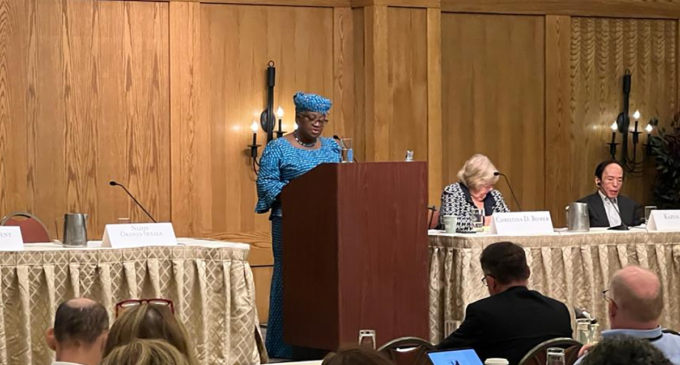Ngozi Okonjo-Iweala, the Director-General of the World Trade Organization (WTO), emphasized that shifting away from open trade would result in increased price volatility, inflationary tendencies, and diminished growth prospects.
She delivered this message during the Jackson Hole Economic Policy Symposium held by the Federal Reserve Bank of Kansas City in the United States.
Okonjo-Iweala stressed that consistent and predictable trade is a factor that contributes to disinflationary stability, reduced market turbulence, and enhanced economic adaptability.
In contrast, she warned that dividing trade into separate competing blocs would come with substantial costs.
“A world that turns its back on open and predictable trade will be one marked by diminished competitive pressures and greater price volatility,” she said.
“It would be a world of weaker growth and development prospects, a slower low-carbon transition, and increased supply vulnerability in the face of unexpected shocks.”
Okonjo remarked that persistent inflation has resurfaced in wealthier countries, leading to the implementation of tighter monetary policies.
This situation has worsened debt challenges and financial instability for numerous developing nations.
Okonjo-Iweala noted that certain policymakers, in response to these shocks and escalating geopolitical tensions, have advocated for a retreat from globalization.
According to the estimations of WTO economists, if the global economy were to fragment into two self-contained trade groups, it could result in a reduction of the overall real global Gross Domestic Product (GDP) by at least five percent in the long run.
This could also lead to substantial welfare losses, particularly for certain developing economies, potentially reaching double digits.
“Despite all the tensions and scepticism around trade, overall trade costs for agricultural products, manufactured goods, and services have fallen by 12% over the past twenty years,” Okonjo-Iweala said.
“In other words, despite some higher policy costs like tit-for-tat tariffs among major trading nations and rising non-tariff barriers, trading goods and services across borders has in aggregate become cheaper, once we account for improvements in transport, communications, regulatory, transaction, and information-related costs, alongside governance factors.
“This is significant because trade cost reductions have historically been a major driver of trade growth.”
Okonjo-Iweala said there is a need to bring more countries into globalised production networks.
“This process, what we at the WTO are calling ‘re-globalization’, offers potential to boost productivity, growth, development, and long-term price stability,” she added.
